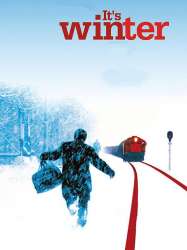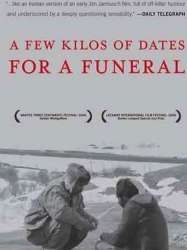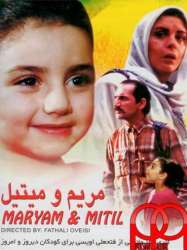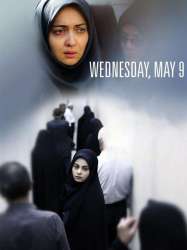Films from the country "iran", sorted by revenue

It's Winter (2006)
Directed by Rafi Pitts
Origin Iran
Genres Drama
Actors Mitra Hajjar
C'est l'hiver raconte des histoires croisées d'hommes au chômage en Iran, et contraints au départ afin de trouver du travail. Le film raconte l'histoire d'un homme qui perd son travail, part à l'étranger et laisse sa femme seule avec leur enfant. L'homme tarde à donner des nouvelles et pendant ce temps sa femme se dirige vers un autre homme en transit, un mécanicien venu travailler dans la région.

Writing on the City (2018)
, 1hDirected by Keywan Karimi
Origin Iran
Genres Documentary
Au moment de la révolution iranienne, point de rupture dans l’histoire politique du pays, les portraits de Khomeini et Shariati couvrent progressivement les murs de la ville de Téhéran. La grande diversité des slogans a teinté la ville de nouvelles couleurs. Puis la guerre Iran-Irak a éclaté. Les images de martyrs, de chefs militaires et de héros ayant bravé la mort ont tapissé la ville. Ses murs sont devenus le thermomètre social et politique de la société iranienne. Un nouvel espace d’expression publique était né, mais un espace paradoxal. D’un art contestataire, les graffitis sont devenus un art officiel, faisant alors naître toute une pratique clandestine…

Delbaran (2001)
, 1h36Directed by Abolzfaz Jalili
Origin Iran
Genres Drama
Kaïm, un adolescent afghan, franchit la frontière qui sépare l'Afghanistan de l'Iran et trouve refuge dans une auberge du hameau de Delbaran. Il aide alors le couple qui y habite.
 , 1h25
, 1h25Origin Iran
Genres Drama, Comedy-drama
Durant l'hiver, deux hommes travaillent dans une station-service qui se trouve à l'écart de la circulation.

Kalagh par (2005)
Origin Iran
Actors Mahnāz Afshār, Mohammad Reza Golzar, Akbar Abdi, Behnoosh Tabatabayi

All alone (2012)
Origin Iran
Rangerou is the nickname of a teenager boy living in one of the Persian Gulf islands with his family. He is pupil at school and at the same time, he works to support his family. He sells fish in the Russian campus, where engineers who are working on the nuclear site of the island live. One night he dreams about a UFO and an abandoned alien but believes it was real. The next day he tells his story to everybody he knows and has met, but no one believes it, except for a Russian boy of his age. Soon they become good friends even though they can't speak the same language. After some time Rangerou, who learned Russian by practice, understands that his friend and all other foreigners have to leave Iran for some obscure, political reasons.

Trench 143 (2014)
, 1h32Origin Iran
Themes Political films
Actors Merila Zarei
Olfat is raising her children in hardship. She has one daughter and one son called Yonos who works in Kerman copper mine. Olfat used to go to the mine and give some food to her son. One day, she finds a note at home with this massage "My friends and I are going to enter the war as soldiers". After reading this note, Olfat and his friend's parents got worried about their sons. When operation Valfajr failed, they received news about Yonos's friend. Olfat is waiting for her son too. As she finds out that the Iraqi radio announces the Iranian captives' names, she ties a radio on her back and carries it everywhere.

The Red Ribbon (1999)
, 1h58Directed by Ebrahim Hatamikia
Origin Iran
Genres Drama, War, Romance
Themes Political films
Actors Parviz Parastui, Reza Kianian, Azita Hajian
Three stubborn characters confront each other in a mine-riddled no-man's-land in the devastated South. Mahboobeh , a headstrong, grief-crazed woman who grew up in the area; Davoud, an embittered veteran focused to the point of insanity on his job clearing mines and Jomeh, an Afghan refugee whose own experience of tragedy gives him the empathy to communicate with his fellow outcasts.

The Double Lottie (1995)
, 1h40Directed by Kiumars Pourahmad
Origin Iran
Genres Drama
Themes Children's films
Actors Khosrow Shakibai
Narges and Nasrin are two elementary school girls who meet each other in a school festival and find out that they are twin sisters. Their parents were separated. Their mother was a dress maker, and their father was a composer and musician, but they have never told their kids about this. One of girls lives with their mother and another one lives with their father. The girls decide to change places, and their parents don't realize what they have done, because the girls look very much alike each other.

Maryam and Mitil (1993)
, 1h33Origin Iran
Genres Drama
Actors Hamideh kheirabadi
Maryam and Mitil is about Maryam who is a six-year-old girl, living in an orphanage who wants to experience life in a family to fill out the emptiness of her life. She has to face a lot of difficulties in order to depend to a great extent on her own determination.
 Connection
Connection

